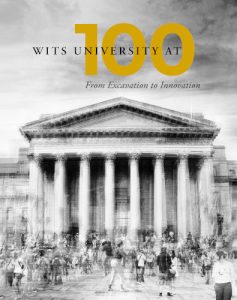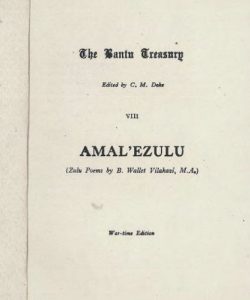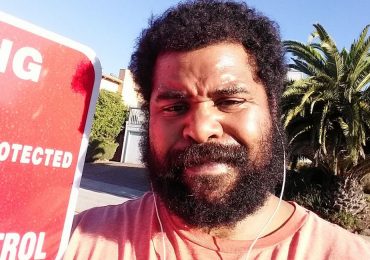The JRB presents an excerpt from Wits University at 100: From Excavation to Innovation, a book that captures important moments of Wits’ story in celebration of the university’s centenary in 2022.

Wits University at 100: From Excavation to Innovation
Wits University Press, 2022
The Last Word: Benedict Vilakazi
Benedict Wallet Vilakazi (1906–1947), affectionately celebrated as the father of Nguni literature and the founder of modern Zulu poetry, was the first Black person in South Africa to receive a doctorate in literature. He was also the first Black person in the then Union of South Africa to teach at a white university. He has a street named after him in Soweto. Yet, outside his body of literary and academic work, little is known about the man behind the words.
In Search of Vilakazi
Khulani Vilakazi, the poet’s grandson, said in a 2006 interview with the Mail & Guardian that his family was still trying to understand more about his grandfather. ‘The family does not know him that much, he died when my father was about four years old [and] my father died when I was three. So, it is difficult for us as a family to produce personal anecdotes about what type of man he was. [He] never had enough time with his family.’ What is clear is that Vilakazi was on a personal quest to preserve and develop the Zulu language. ‘He saw himself as being sent by the ancestors [for this purpose]. His poem “Ngizwa Ingoma” speaks to that notion, of a person anointed,’ said Khulani.
Indeed, Vilakazi cut himself off from his birthplace, family and ancestors when he moved to Johannesburg at the age of 29 to pursue his academic career and he would lament this in much of his poetry. Part of his poem ‘Wo, Ngitshele Mntanomlungu’ describes the move:
Ungiletheleni lapha?
(Why have you brought me here?)
Ngingen’ amadol’ angisinde
(I enter with heavy knees)
Ngicabang’ ikhanda lizule
(I think and my head spins).
Vilakazi’s childhood was spent herding cattle and, until the age of ten, attending the local mission school. He then transferred to a co-educational Roman Catholic secondary school. After completing his schooling, he trained as a teacher and then taught at the Ohlange Institute in Phoenix near Durban. Studying on his own, he earned a BA degree in African studies with distinction from Unisa in 1934, with special work on the Zulu language.
He was initiated as an imbongi, a traditional composer, in the Zondi clan. His birthplace of KwaDukuza, close to the main headquarters of the nineteenth-century Zulu king Shaka kaSenzangakhona, provided Vilakazi with imagery for his poetry. He was determined to cement the Zulu language as a mighty force—as King Shaka did with his people.

Groundbreaking Work
Wits University Press (WUP), which is the oldest university press in South Africa (established in 1922), published Vilakazi’s first book of poems, Inkondlo kaZulu, in 1935. By then, he was already well known as a poet and a writer and his works had been published in various journals and newspapers such as The Star, UmAfrika and The Bantu World. Coincidentally, Wits was looking for an assistant in the Department of African Languages at the time, and Vilakazi was appointed as language assistant to Professor CM Doke, head of the department, that same year.
WUP published Vilakazi’s second volume of poetry, Amal’eZulu (1945), as well as the first Zulu-English dictionary, which Vilakazi compiled in collaboration with Doke. In 1946, he received a doctorate in literature from Wits.
Vilakazi also published three novels in the 1930s: Noma Nini! (Mariannhill Mission Press), Udingiswayo KaJobe (Sheldon Press) and Nje Nempela (Mariannhill Mission Press). His volumes of poetry and novels are all on the list of required reading in Zulu literature courses.
Through his writing, Vilakazi became a spokesperson for his people, though he was never overtly political. He often articulated social issues that remain relevant today, including the safety of Black miners, the plight of the poor, and the impact of industrial advancement on human values. These are still societal challenges that the University is tackling today—for example, through the Wits DigiMine, the Southern Centre for Inequality Studies, and the use of new digital technologies to advance humanity.

Continuous Struggle
‘The time has now come to end any discrimination in my department on the grounds of race or colour.’
—Professor Clement M Doke
Despite his success, Vilakazi faced discrimination and criticism. His appointment at Wits was opposed by conservative whites who could not come to terms with an African man lecturing white students. He was also scorned and ridiculed by Black people, who wrote letters of discontent to newspapers condemning Vilakazi for consenting to be used by whites through such a ‘collaborationist appointment’, as Dumisane Krushchev Ntshangase wrote in a 1995 paper for the Wits Institute for Advanced Social Research.
Professor Humphrey R Raikes, the then principal of Wits, personally wrote a letter to Vilakazi to explain his position at his new job. He would be a junior academic staff member, would look after the ‘Native library’ and would take care of African students only. He would not be allowed to teach, grade or supervise white students unless they asked for help in their Zulu courses.
In a letter in the Wits Archives, dated January 1947, Doke wrote to the Human Resources Department that ‘the time has now come to end any discrimination in my department on the grounds of race or colour’, requesting that Vilakazi’s status be changed to that of lecturer.
In October that same year, Vilakazi died suddenly of meningitis. He was survived by five children, who attended his funeral at Mariannhill along with thousands of people.
In their collaborative dictionary, published a year after Vilakazi’s death, Doke wrote: ‘[The] sudden death of Dr Vilakazi, cut off amid further research and literary activity, has deprived the African people of a brilliant son, one who not only achieved high academic standing but whose life and personality gained for him a lasting place in their affections. This dictionary of his mother-tongue—the language he loved—will stand as a monument to a great African.’
Vilakazi was born Bhambatha ka Mshini and changed his name to Benedict Wallet after converting to Roman Catholicism. At his mother’s insistence, he kept the family name Vilakazi.
Vilakazi spent some time at Mariannhill training for the priesthood, but his fascination was an intellectual rather than a spiritual one—he soon changed his vocation to that of a writer.
The Order of Ikhamanga (Gold) was conferred on Vilakazi posthumously in 2016 for ‘his exceptional contribution to the field of literature in indigenous languages and the preservation of isiZulu culture’.
~~~
Publisher information
Wits University celebrates 100 years of academic and research excellence, innovation, and social justice in 2022. The origins of Wits lie in the South African School of Mines, which was established in Kimberley in 1896 and transferred to Johannesburg as the Transvaal Technical Institute in 1904, becoming the Transvaal University College in 1906 and renamed the South African School of Mines and Technology four years later. Full university status was granted in 1922, incorporating the College as the University of the Witwatersrand. Professor Jan H Hofmeyr was its first Principal.
The University of the Witwatersrand occupies a special place in the hearts and minds of South Africans. Its history is inextricably linked with the development of Johannesburg, with mining and economic development, and with political and social activism across the country.
Wits University at 100: From Excavation to Innovation captures important moments of Wits’ story in celebration of the university’s centenary in 2022. It explores Wits’ origins, the space and place that it occupies in society, and its transformation as it prepares the ground for the next century. From its humble beginnings as a mining college in Johannesburg to its current position as a flourishing and inclusive university, Wits University at 100 is a story of innovation driven from the global South.
In text and image, Wits is presented as a dynamic institution that thrives because of its people, many of whom, in one way or another, have shifted the world. The experiences, achievements and insights of past and present ‘Witsies’ come alive in this glossy, full-colour book that maps the university’s vision for the future.





